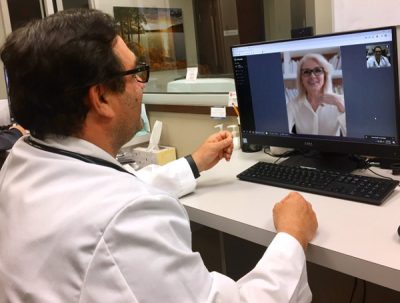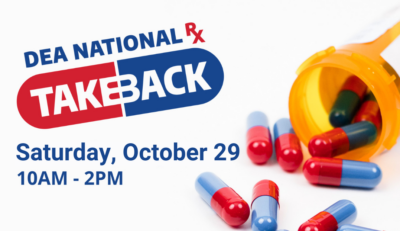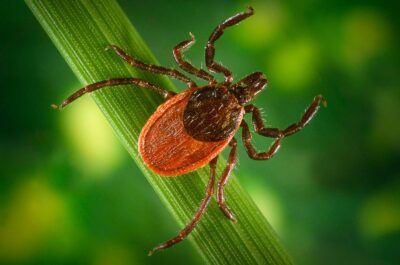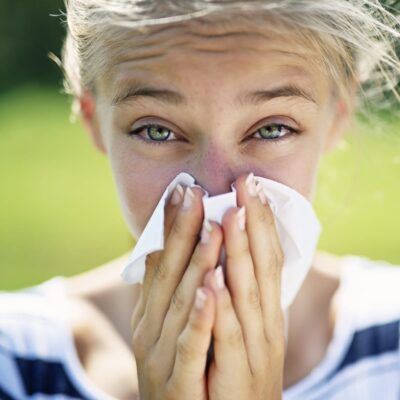 Remote work, Zoom meetings, and telemedicine are all here to stay. Here’s how to know when a telemedicine call with your health care provider is appropriate and when it’s not.
Remote work, Zoom meetings, and telemedicine are all here to stay. Here’s how to know when a telemedicine call with your health care provider is appropriate and when it’s not.
The COVID pandemic changed the way we work and communicate. And telemedicine, or telehealth, which enables video or phone appointments between a patient and their health care provider, is now an accepted and safe way for you to communicate with your doctor. A telemedicine visit can minimize the spread of infectious diseases by allowing the patient and provider to communicate remotely. But as described in an article from Harvard Health, it does have its limitations.
“Telemedicine can be a great tool, but only under very specific circumstances,” said Lakes Urgent Care medical director, Dr. Haidar Al-Saadi. “Because of the services we provide and the treatments we offer at Lakes Urgent care, we’re almost always going to want to see you in the office.” If you’d like to set up a remote call with Lakes Urgent Care, contact us first to discuss your health concerns, and one of our providers will be able to determine if a call is appropriate.”
Lakes Urgent Care now provides telemedicine appointments, but the best application of a this type of appointment is as a follow-up to a previous in-person visit. It’s also a great way to discuss a new concern with your primary care physician, who is already familiar with your health history.
Click here for more information about scheduling a telemedicine visit with a Lakes Urgent Care provider.
 Seasonal Affective Disorder (SAD), is a type of depression that occurs during the cloudy fall and winter months. If you think you might be suffering from SAD, Light therapy is a treatment option that might be right for you. This treatment involves exposure to bright, full-spectrum light, usually from a specialized light box, for a certain amount of time each day. The goal is to mimic the effects of natural sunlight and regulate your body’s circadian rhythm.
Seasonal Affective Disorder (SAD), is a type of depression that occurs during the cloudy fall and winter months. If you think you might be suffering from SAD, Light therapy is a treatment option that might be right for you. This treatment involves exposure to bright, full-spectrum light, usually from a specialized light box, for a certain amount of time each day. The goal is to mimic the effects of natural sunlight and regulate your body’s circadian rhythm.
The use of light therapy for SAD was first proposed in the 1980s, and since then, numerous studies have evaluated its effectiveness. The results have been promising, with many patients reporting improvement in their symptoms after just a few weeks of treatment. In fact, light therapy is now considered to be a first-line treatment for SAD by the American Psychiatric Association.
The reason why light therapy works is not fully understood, but it is believed to be related to the regulation of melatonin, a hormone that plays a role in regulating your body’s sleep-wake cycle. In SAD patients, melatonin levels are often elevated during the day, leading to feelings of fatigue and depression. By exposing SAD patients to bright light, the therapy may help to reduce melatonin levels and improve mood.
Light therapy is typically administered using a light box, which is a device that emits bright light. The patient sits or works near the light box for a certain period of time each day, usually in the morning. The duration of treatment and the intensity of the light varies based on the severity of symptoms.
Light therapy should not be used as a substitute for other treatments such as counseling or medication. Always consult with a healthcare professional before starting any treatment, especially if you have a history of bipolar disorder or other psychiatric conditions. Side effects are generally mild, but can include headaches, eye strain, and nausea.
If you suffer from seasonal affective disorder (SAD) Light therapy can be an effective treatment option. Talk to your healthcare professional, or visit us at Lakes Urgent Care in West Bloomfield or Livonia, to see if it’s right for you.
 Do cold, sinus, or allergy symptoms have you all stuffed up? A neti pot could bring you relief. Neti pots have been around for a long time, and they are easy to use. According to a recent article in the New York Times, a substantial amount of medical research confirms that, when administered correctly, using a neti pot is both safe and effective.
Do cold, sinus, or allergy symptoms have you all stuffed up? A neti pot could bring you relief. Neti pots have been around for a long time, and they are easy to use. According to a recent article in the New York Times, a substantial amount of medical research confirms that, when administered correctly, using a neti pot is both safe and effective.
Your nose does a great job of trapping and filtering much of the bad stuff we all inhale each day, such as viruses, bacteria, and pollutants. But if you are congested, rinsing the sinus cavities with a warm saline solution will wash it all away, and can help you feel better without the use of drugs or medications.
You can pick up a neti pot online or at any local drugstore. Fill it with a saline solution made with distilled water, tilt your head, and pour the spot through one nostril and it flushes out the mucous and other irritants that are causing discomfort and difficulty breathing out the other.
“It’s important to always use distilled water when using a neti pot,” said Lakes Urgent Care medical director Dr. Haidar Al-Saadi. “There have been many instances of infections caused by using regular tap water, but if you always use distilled water you are safe. You can also boil tap water for three to five minutes and let it cool before using.” Before using a neti pot for the first time, here’s a step by step guide from the U.S. Food & Drug Administration for making the saline solution with the distilled water.
If you have chronic sinus or congestion issues, regular and consistent use of a neti pot can help you feel better. If you still need help, the staff at Lakes Urgent Care in West Bloomfield or Livonia can offer additional treatment options.

Here in metro Detroit, and across the country, cases of RSV are showing up earlier and with more frequency than usual this year. RSV is nothing new. It stands for Respiratory Syncytial Virus, and it’s a common cause of typical cold-like symptoms. People who get infected with RSV get a runny nose, cough, and fever, and are contagious for three to eight days.
We are hearing about RSV in the news right now because the virus is showing up in our population earlier this year, there are more cases than usual, and some have produced more severe patient reactions, according to a recent article in AOL News. A November 3, 2022 story in Patch reports that they are seeing a “sharp increase in RSV cases within the last month.”
“This surge of RSV is the worst that we’ve seen in 25 years,” said Dr. Matthew Denenberg, chief and chair of Beaumont Children’s at Corewell Health East (formerly Beaumont Health system) as reported in recently in Crain’s Detroit. Crain’s went on to report that Corewell East’s eight hospitals have 90 pediatric beds and 12 intensive-care unit beds. All are full.
“If your child is having difficulty breathing, immediately go to your primary care physician’s office or local emergency department right away. In severe cases, the patient will receive oxygen, breathing treatments, and steroids,” said Lakes Urgent Care medical director, Dr. Al-Saadi. “For most children and adults, a case of RSV will result in nothing more than typical cold symptoms,” said Dr. Al-Saadi. We offer an RSV test at our offices in West Bloomfield and Livonia. We can also provide a treatment plan to lessen the symptoms.”
Respiratory Syncytial Virus is most dangerous with infants, older adults, and anyone who is prone to a severe lung infection. Babies and small children, who are most vulnerable to RSV were sheltered from virus during pandemic lockdowns and safety precautions are encountering RSV for the first time.
The best defense against RSV is to do all the things that always help you from getting sick. Wash your hands. Cough/sneeze into your shoulder. If you are feeling sick, stay home and avoid contact with small children. If you must be around others or small children, mask up. If you are the parent of a small child, pay extra attention to their surrounds and avoid putting them in contact with others who may be sick.
 We’ve all done it: we don’t use up a prescription or we leave a long-expired medication in the medicine cabinet. That’s why the annual DEA Drug Take Back Day this Saturday from 10am-2pm is an excellent reminder and opportunity to go through your home and dispose of it all safely.
We’ve all done it: we don’t use up a prescription or we leave a long-expired medication in the medicine cabinet. That’s why the annual DEA Drug Take Back Day this Saturday from 10am-2pm is an excellent reminder and opportunity to go through your home and dispose of it all safely.
“Leaving medications unneeded or expired prescription drugs in your home is not safe,” said Lakes Urgent Care Medical Director Dr. Haidar Al-Saadi. “Children are curious or think a medication looks like candy. Teens and adults may seek to use certain drugs, like opioids, for illegal or unintended purposes. Lakes Urgent Care supports the DEA Drug Take Back Day and encourages everyone to bring all expired medications to one of the safe drop off locations in our community.”
Local police departments and other DEA sanctioned locations will safely collect and dispose of any unwanted medications. Farmington Hills and other area police departments have permanent and secure collection bins at the front desk area year-round, so if you can’t make it this Saturday, you can likely find a place where you can safely dispose of unneeded prescription drugs.

Dr. Haidar Al-Saadi, Lakes Urgent Care Medical Director
Just like Christmas tree displays pop up in the stores before Halloween, free flu shot offer signs also show up a bit too soon. If you haven’t gotten your annual flu shot yet, you are right on schedule.
“October is really the ideal month to get your annual flu shot,” said Lakes Urgent Care Medical Director Dr. Haidar Al-Saadi. “That’s because it takes a few weeks for the vaccine to become effective and flu season typically begins in November as we all start to move all activities indoors, kids are back in school, and celebrate holidays together.”
Everyone six months and older is eligible and should get a flu shot every year. For adults 65 and older, Lakes Urgent Care has a special high-dose version of this year’s vaccine, available at both our West Bloomfield and Livonia locations. Walk in any time, no appointment needed.
“Unfortunately, due to a variety of factors and early indications about the flu season in Australia, this is shaping up to be a worse than normal flu season here in Southeast Michigan,” said Dr. Al-Saadi. “We encourage everyone to get their annual flu vaccine in addition to being up to date with the latest COVID vaccine booster.”
According to a recent article in Popular Science and other sources, there are a few clear-cut indicators that suggest we may be in for a rough flu season. Essentially, a bad flu season abroad and low US/Southeast Michigan vaccination rates for the flu are the reason why so many people are predicting that we may be in for a rough flu season.
 It seems like everyone is playing Pickleball these days. This fast paced outdoor game is part tennis, part ping pong, and a lot of fun to play. But while it can be a casual and social game, some take their Pickleball very seriously, the action can get intense, and Pickleball injuries are on the rise. Those quick stops, starts, and spins can lead to ankle sprains, pulled muscles, or worse.
It seems like everyone is playing Pickleball these days. This fast paced outdoor game is part tennis, part ping pong, and a lot of fun to play. But while it can be a casual and social game, some take their Pickleball very seriously, the action can get intense, and Pickleball injuries are on the rise. Those quick stops, starts, and spins can lead to ankle sprains, pulled muscles, or worse.
According to a recent article in the New York Times, Pickleball injuries were on the rise even before the pandemic. One analysis, published in 2019 in The Journal of Emergency Medicine, estimated that there were 19,000 pickleball injuries in 2017, with 90 percent of them affecting people 50 and older.”
For minor sprains and strains, the R.I.C.E. method works best: rest, use ice on the injured area, and keep it elevated. This can help dull the pain, minimize the swelling, and help you heal and recover faster. You can also add an anti-inflammatory drug such as NSAIDs to help with pain and swelling.
But if you injure yourself and cannot reliably bear weight on a lower extremity or use your upper extremity for simple tasks like opening a door or carrying a book, it is best to have a physician evaluate that injury and take diagnostic x-rays to rule out the possibility of a fracture. Keep in mind that even though somebody may be able to move a joint, there may still be an underlying fracture and the only reliable method to determine this is with an x-ray and a physician evaluation.
“Since most of us are weekend/after work athletes, Lakes Urgent Care is open late, and we can be a great resource for all sports injuries,” said Dr. Haidar Al-Saadi, Lakes Urgent Care’s medical director. “We have digital x-ray capabilities on site, and we can quickly help determine if you just have a sprain or strain. If your injury is more serious, we can either treat your injury on-site or refer you to a specialist.”

Black legged tick found in Southeast MI
Our changing climate, as discussed in a recent MI Radio report, is giving ticks the opportunity to gain a stronger foothold in Southeastern Michigan. Knowing how to avoid and remove ticks is smart summertime safety, as ticks can spread disease to you, your family, and your pets.
How to avoid ticks: When on a hike, walk in the center of the trail. Wear light colored clothing to make ticks easy to spot. Apply an insect repellent containing at least 20% DEET. Consider wearing clothing treated with permethrin when hiking or working in wooded areas. After returning from a possible exposure area, consider placing clothes in a dryer on high heat for at least 60 minutes. This will kill the ticks. In Southeast Michigan, the greatest time of risk is from April through September.
How to remove a tick: Ticks are skillful at attaching themselves to skin, and it’s difficult to remove them. Use fine tweezers to grasp the tick as close to the skin surface as possible. Pull at a perpendicular angle to the skin surface until the tick lets go. Remove a tick as quickly as possible to decrease the length of exposure. Avoid “breaking” the tick. Any small pieces left in the skin could cause a localized infection. You may also visit us at Lakes Urgent Care for this procedure.
If a bite gets infected: Initial signs and symptoms include itching, burning, and redness in a circular fashion around the tick bite. Sometimes that rash can proceed to what is called a bull’s-eye lesion with concentric red circles around the bite area. If the disease is going to progress, you’ll start to have flu-like symptoms including muscle aches, fatigue, headache, and fever.
If you begin to experience any of these symptoms, immediately see your primary care physician or a certified urgent care like Lakes Urgent Care for diagnosis and treatment.
Additional links and information:
There’s a tick boom in Michigan – Here are 5 things you should know
 Our spring season is off to a chilly start, but it won’t be long before the 2022 allergy season, like the leaves, flowers, and grass, will be in full bloom. If you suffer from spring allergies, here’s some information and tips to help get you through the season.
Our spring season is off to a chilly start, but it won’t be long before the 2022 allergy season, like the leaves, flowers, and grass, will be in full bloom. If you suffer from spring allergies, here’s some information and tips to help get you through the season.
New research is predicting that the 2022 allergy season will be longer and more intense due to climate change. According to Dr. Sindhura Bandi, Rush University Medical Center-Division of Allergy and Immunology, some trees have been releasing pollen ahead of schedule, and the 2022 allergy season is starting earlier.
And a new University of Michigan study also confirms that climate change is making our pollen season longer and more miserable. “We saw different species react differently to climate change, oak and cypress families are very sensitive to climate change and in the future, they will have a big increase,” said Yingxiao Zhang, lead author of the study.
If you suffer from spring allergies, your best defense is to talk to your doctor or visit us at Lakes Urgent Care to understand what allergens make you miserable and proactively start your treatment program.
Prepare early for the 2022 allergy season
Preparing early for the 2022 allergy season now can significantly reduce your symptoms once the season begins. The best way to prepare is to talk to your primary care physician about your specific allergy symptoms. They may have you start preventative allergy medications now, which can help prevent early inflammation and the cascade of allergic reactions before they spiral out of control. If you’re not sure of the source of your allergies, see your doctor right away and get tested. Knowing what types of allergens trigger your symptoms can help refine treatments and help you reduce exposure. The CDC is an excellent source of information about particular types of allergies and pollens.
Have a seasonal allergy action plan and think preventative. When you use medications early, you may ease your symptoms all spring. Finding the right combination of treatment might take a bit of trial and error:
- Antihistamines can help sneezing, runny nose, or itchy eyes.
- Decongestants can help when you’re all stuffed-up because they shrink the lining of the passages in your nose. You can try a nasal spray or a pill but be aware of potential rebound effect with long-term use – they are best used for occasional relief.
- Nasal corticosteroid sprayed into your nose can give you relief from stuffiness and sneezing. These are very effective when used regularly, but they may take a few days or weeks to kick in.
- The masks you’ve been wearing lately can also be a great defense from pollen and other allergens. Wearing a mask when spending time outdoors can ease your misery.
Always consult with your primary care physician if you take other routine medications to avoid potentially problematic interactions.

walking like a penguin can help you avoid falls in icy outdoor conditions.
Falls account for over 8 million hospital emergency room visits each year, representing the leading cause of visits. And as we age, falls become more dangerous to our health. Here are some tips for keeping your balance and on your feet when it gets slippery out there.
- Take small careful steps instead of large ones. When getting out of a vehicle, step, don’t jump. When possible, use handrails, handles – anything that will help keep your balance.
- Don’t carry large loads while walking on snow or ice. If you are carrying a load on an icy walk and feel yourself falling, toss your load to break the fall with your arms.
- While walking, retain stability by keeping your hands out of pockets.
The government of Alberta Canada’s website contained a valuable list of additional tips:
- Find a path around snow or ice when you can.
- Learn how to Walk Like a Penguin (video)—walk slowly, take small steps, and point your toes out slightly to be more stable on icy paths.
- Keep your head up and don’t lean forward.
- Keep your hands out of your pockets to help keep your balance.
- If you use a cane, you can buy an ice pick for the cane.
If you have fallen, wait a moment and do a “self-assessment” rather than quickly getting up. Most bumps and bruises do not require medical attention. However, if pain from a fall persists beyond a few hours or you are unable to bear weight or move an upper extremity without pain, be sure to get evaluated by a physician. If the fall should cause a broken bone with skin disruption, get emergency care immediately. Most other sprains, strains or fractures can be safely treated by your primary care physician or at a certified urgent care. Lakes Urgent Care, in West Bloomfield and Livonia is a certified urgent care and can complete digital x-rays and initiate fracture care and casting, avoiding a visit to the emergency department.
More Information:
Preventing Falling on Ice and Snow